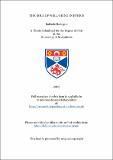Files in this item
The role of well-being in ethics
Item metadata
| dc.contributor.advisor | Skorupski, John | |
| dc.contributor.author | Rodogno, Raffaele | |
| dc.coverage.spatial | 227 p. | en_US |
| dc.date.accessioned | 2018-05-16T12:54:13Z | |
| dc.date.available | 2018-05-16T12:54:13Z | |
| dc.date.issued | 2003 | |
| dc.identifier.uri | https://hdl.handle.net/10023/13350 | |
| dc.description.abstract | In this thesis I assess the role of well-being in ethics. In order to do so I reply to a threefold charge against the importance of well-being in ethics. In What We Owe to Each Other Scanlon argues (1) that the concept of well-being plays very little role in the thinking of an agent; (2) that no unified theory of well-being can be found; (3) that welfarism is false. In Part I, I argue that the concept of well-being does play an explanatorily and justificatorily important role in the thinking of a rational agent. I arrive at this conclusion by distinguishing levels of thinking activity as well as by considering the implicit rather than explicit role well-being plays in our deliberation. I conclude this part of the thesis by illustrating the relation between the idea of well-being, its parts and its sources. In Part II, I put forward a unified theory of well-being and I do so by taking on board with a slight modification Scanlon's own buck-passing account of value. I argue that something is a part of a person's good if, and only if, there is reason for this person to desire it. I claim that this account does not fall prey to the 'scope problem'. I also discuss a number of different though connected issues such as the defence of the claim that well-being is itself a normative notion and issues concerning the various parts of well-being. In Part III, I begin to sketch the normative role of well-being both first-personally and impartially. With Scanlon, I agree that welfarism is false. Yet, I argue in favour of a moderate form of welfarism, a view that takes a positive function of each individual's well-being to afford the ultimate criterion of practical reason. | en_US |
| dc.language.iso | en | en_US |
| dc.publisher | University of St Andrews | |
| dc.subject.lcc | BJ1012.R73 | |
| dc.subject.lcsh | Ethics | en |
| dc.title | The role of well-being in ethics | en_US |
| dc.type | Thesis | en_US |
| dc.type.qualificationlevel | Doctoral | en_US |
| dc.type.qualificationname | PhD Doctor of Philosophy | en_US |
| dc.publisher.institution | The University of St Andrews | en_US |
This item appears in the following Collection(s)
Items in the St Andrews Research Repository are protected by copyright, with all rights reserved, unless otherwise indicated.

